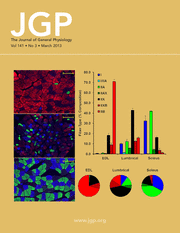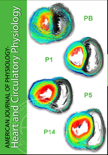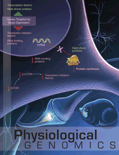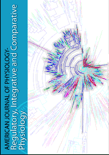
PHYSIOLOGICAL RESEARCH
Scope & Guideline
Championing Free Access to Pioneering Research
Introduction
Aims and Scopes
- Physiological Mechanisms and Pathophysiology:
Research articles often explore the underlying mechanisms of physiological functions and their alterations in disease states, contributing to a better understanding of pathophysiological processes. - Translational Research:
The journal emphasizes translational research that bridges the gap between laboratory findings and clinical applications, making it relevant for both researchers and healthcare professionals. - Integrative Physiology:
Studies integrating various physiological systems (e.g., cardiovascular, respiratory, muscular) are a core focus, highlighting the interactions between different bodily systems. - Animal Models in Physiology:
A significant number of studies utilize animal models to investigate physiological phenomena and disease mechanisms, providing insights that may translate to human health. - Molecular and Cellular Physiology:
The journal publishes research on molecular and cellular mechanisms underlying physiological processes, including gene expression, signaling pathways, and metabolic functions. - Clinical Implications of Physiological Research:
Many articles discuss the clinical relevance of physiological findings, aiming to influence treatment strategies and improve patient outcomes.
Trending and Emerging
- Cardiovascular and Metabolic Health:
Research related to cardiovascular physiology and metabolic disorders has increased, highlighting the importance of understanding the interplay between these systems in health and disease. - Neurophysiology and Mental Health:
There is a rising trend in studies examining the physiological basis of neuropsychiatric disorders, reflecting greater awareness of mental health issues and their physiological underpinnings. - Impact of Lifestyle Interventions:
Studies investigating the effects of lifestyle factors, such as diet and exercise, on physiological health are gaining prominence, paralleling public health initiatives aimed at promoting healthier lifestyles. - Immunophysiology:
Research exploring the interactions between the immune system and physiological processes is emerging, particularly in the context of inflammation and chronic diseases. - Physiological Responses to Environmental Stressors:
An increase in research examining how environmental factors (e.g., climate change, pollution) affect physiological responses and health outcomes is evident, aligning with global health concerns.
Declining or Waning
- Traditional Pharmacological Studies:
There has been a noticeable decrease in studies solely focused on traditional pharmacological interventions, as the field moves towards more integrative and systems biology approaches. - Basic Physiology without Clinical Relevance:
Research that does not connect basic physiological findings to clinical applications is appearing less frequently, indicating a shift towards studies with direct implications for patient care. - Single-Factor Analyses:
Studies focusing exclusively on single physiological factors or isolated variables are declining, as there is a growing preference for multifactorial and systems-level analyses.
Similar Journals

JOURNAL OF GENERAL PHYSIOLOGY
Exploring the Depths of Biological MechanismsJOURNAL OF GENERAL PHYSIOLOGY, published by Rockefeller University Press, is a leading peer-reviewed journal that has been at the forefront of physiological research since its inception in 1918. With an ISSN of 0022-1295 and an E-ISSN of 1540-7748, this esteemed journal maintains an impressive Q1 ranking in the field of Physiology, reflecting its high-quality contributions to both the basic and applied aspects of physiology. Regularly cited in the scientific community, it ranks 70th out of 193 in the category of Biochemistry, Genetics, and Molecular Biology, showcasing its significant impact within academic circles. The journal publishes original research, reviews, and commentaries, aiming to advance the understanding of physiological mechanisms and their implications across various biological systems. Although not Open Access, the journal remains a vital resource for researchers, professionals, and students dedicated to exploring the depths of cardiopulmonary function, neurophysiology, and cellular biochemical processes. The JOURNAL OF GENERAL PHYSIOLOGY continues to serve as a critical platform for disseminating innovative findings and fostering collaboration among scientists globally.

AMERICAN JOURNAL OF PHYSIOLOGY-HEART AND CIRCULATORY PHYSIOLOGY
Pioneering insights in cardiovascular science.AMERICAN JOURNAL OF PHYSIOLOGY-HEART AND CIRCULATORY PHYSIOLOGY, published by the American Physiological Society, is a premier journal dedicated to advancing the understanding of cardiovascular physiology. With an ISSN of 0363-6135 and an E-ISSN of 1522-1539, this esteemed journal has been a vital resource since its inception in 1977, and continues to publish cutting-edge research that shapes the fields of cardiology and physiology. Recognized as a Q1 journal in multiple categories, it ranks impressively within the top tier of its fields, including a notable 18th percentile rank in Physiology (medical). The journal’s impact factor and extensive reach in the academic community affirm its significance in promoting innovative studies and insights. While it does not offer open access options, the journal remains accessible through institutional subscriptions, making it an essential tool for researchers, professionals, and students alike, who are keen to stay abreast of the latest developments in heart and circulatory physiology. For further information, the journal is based in the United States at 6120 Executive Blvd, Suite 600, Rockville, MD 20852. As a cornerstone of cardiovascular research, it invites contributions that push the boundaries of knowledge and enhance clinical practice.

Physiological Genomics
Pioneering Research at the Intersection of Genes and PhysiologyPhysiological Genomics is a prestigious scholarly journal published by the American Physiological Society, dedicated to advancing the understanding of the genetic underpinnings in physiology. With an ISSN of 1094-8341 and an E-ISSN of 1531-2267, this journal serves as a vital platform for researchers exploring the intersection of genetics and physiological processes. As of 2023, it enjoys a respectable impact factor, particularly standing strong in the Q2 quartile in both Genetics and Physiology categories, illustrating its importance within a competitive landscape. With an impressive rank of #69 out of 193 in Biochemistry, Genetics, and Molecular Biology - Physiology, and #128 out of 347 in Genetics, it reflects a robust commitment to quality research. Committed to fostering innovation, Physiological Genomics provides comprehensive access to groundbreaking studies from 1999 to 2024 and remains a quintessential resource for researchers, professionals, and students alike aiming to enhance their understanding of physiological genomics.

American Journal of Physiology-Regulatory, Integrative and Comparative Physiology
Elevating the Standard of Physiological ScholarshipThe American Journal of Physiology-Regulatory, Integrative and Comparative Physiology, published by the American Physiological Society, serves as a premier platform for disseminating cutting-edge research in the fields of physiology, emphasizing regulatory, integrative, and comparative studies that advance our understanding of bodily functions. With an ISSN of 0363-6119 and E-ISSN of 1522-1490, this esteemed journal is recognized for its substantial impact, maintaining a 2023 Q2 ranking in both the physiology and medical physiology categories as well as commendable positions in Scopus rankings. The journal has been pivotal since its inception in 1977 and continues to foster interdisciplinary dialogue among researchers, professionals, and students alike, contributing significantly to the evolving landscape of physiological sciences. Although it operates under a traditional subscription model, its commitment to high-quality, peer-reviewed content ensures that it remains an essential resource for anyone engaged in physiological research and education.

Frontiers in Physiology
Unleashing innovative insights for health and disease.Frontiers in Physiology, published by FRONTIERS MEDIA SA, is a leading open-access journal that has been at the forefront of physiological research since its inception in 2010. As a reputable publication based in Switzerland, it aims to foster the dissemination of groundbreaking findings across various domains of physiology, engaging a global audience of scholars and practitioners. With a commendable Q2 ranking in the fields of both general physiology and medical physiology for 2023, this journal stands out in its field, achieving a significant Scopus rank of #32/113 in medical physiology and #58/193 in biochemistry, genetics, and molecular biology. Frontiers in Physiology not only commits to maintaining high scholarly standards but also ensures that all its articles are freely accessible, thereby promoting collaborative knowledge exchange. With a clear focus on advancing our understanding of physiological processes, the journal plays a crucial role in the development of innovative approaches to health and disease, making it an essential resource for researchers, professionals, and students alike.

PHYSIOLOGICAL AND BIOCHEMICAL ZOOLOGY
Fostering Innovation in Animal Science ResearchPhysiological and Biochemical Zoology is a distinguished peer-reviewed journal published by University of Chicago Press, focusing on the interrelated fields of animal physiology, biochemistry, and zoology. With a strong commitment to advancing scientific understanding, this journal serves as a vital resource for researchers, professionals, and students alike, providing a platform for the latest findings and advancements in the field. Ranking in the top quartile (Q1) in Animal Science and Zoology as of 2023, and showcasing a substantial convergence of historical data from 1999 to 2023, its impact in the academic community is underscored by its engagement with high-quality research. While it also appears in the third quartile for Biochemistry and Physiology, the journal successfully integrates these disciplines, reflecting the complexity of biological systems. Available for reading via various access options, this journal is essential for anyone seeking to deepen their knowledge or contribute to the field of Zoological sciences.

Current Research in Physiology
Advancing the Frontiers of Physiological ScienceCurrent Research in Physiology is an esteemed academic journal published by Elsevier, aimed at advancing the field of physiology through high-quality research contributions. Since its inception in 2019, the journal has provided a platform for innovative studies and reviews, addressing both fundamental and applied aspects of physiology across various biological systems. With its ISSN 2665-9441, it operates under a non-open access model, ensuring rigorous peer review while also fostering a broad readership. The journal has been classified in the Q3 category for both Physiology and Medical Physiology as of 2023, reflecting its growing influence and relevance, as evidenced by its Scopus rankings within the respective fields. Designed for researchers, clinicians, and students alike, Current Research in Physiology is committed to disseminating cutting-edge research that informs both academic inquiry and clinical practice, paving the way for future advancements in physiological science.

CANADIAN JOURNAL OF PHYSIOLOGY AND PHARMACOLOGY
Exploring the Intersections of Physiology and PharmacologyCanadian Journal of Physiology and Pharmacology, published by Canadian Science Publishing, is a leading peer-reviewed journal dedicated to advancing knowledge in the fields of physiology and pharmacology. With an ISSN of 0008-4212 and an E-ISSN of 1205-7541, this journal has been at the forefront of biomedical research since its inception in 1964. The journal operates within a constrained access model, ensuring a selective dissemination of high-quality research, while maintaining its esteemed position in the Q3 quartile across multiple relevant categories such as Medicine, Pharmacology, and Physiology as of 2023. Researchers, professionals, and students alike will find the journal a valuable resource for emerging trends and comprehensive studies that shape contemporary science, as evidenced by its competitive Scopus rankings. The Canadian Journal of Physiology and Pharmacology is vital for fostering scholarly dialogue and innovation in the scientific community, encouraging contributions that promote a deeper understanding of physiological and pharmacological phenomena.

Journal of Experimental Zoology Part A-Ecological and Integrative Physiology
Empowering research for a sustainable biological future.The Journal of Experimental Zoology Part A - Ecological and Integrative Physiology, published by WILEY, is a distinguished peer-reviewed journal focusing on ecological and evolutionary physiology, providing a robust platform for research that bridges both ecological and integrative physiological concepts. With an impressive impact factor and recognition as a Q1 journal in both Animal Science and Zoology and Ecology, Evolution, Behavior and Systematics in 2023, it positions itself as a leader in advancing our understanding of organismal biology and environmental interactions. The journal is committed to open access, offering researchers and professionals worldwide the opportunity to share and disseminate their findings freely. Since its inception in 2017, it has rapidly gained prominence—ranking within the top percentiles of Scopus Ranks across several disciplines, including genetics and molecular biology. This not only underscores its relevance but also highlights its vital role in facilitating interdisciplinary approaches essential for addressing contemporary biological challenges. Researchers, educators, and students alike will find in this journal a valuable resource for cutting-edge studies and innovative methodologies in the field.

JOURNAL OF EVOLUTIONARY BIOCHEMISTRY AND PHYSIOLOGY
Illuminating Evolutionary Adaptations Through Biochemical ResearchJOURNAL OF EVOLUTIONARY BIOCHEMISTRY AND PHYSIOLOGY, published by PLEIADES PUBLISHING INC, is a pivotal periodical that delves into the intricate relationships between biochemical processes and evolutionary dynamics. With its ISSN 0022-0930 and E-ISSN 1608-3202, this journal serves as a comprehensive platform for researchers, professionals, and students dedicated to understanding the physiological adaptations and biochemical mechanisms influenced by evolutionary pressures. Although it is not an open access journal, it offers valuable insights across its historically significant coverage spanning from 1972 to 2017, making it an essential resource for those working in agricultural, biological, and molecular sciences. Despite its current Scopus rankings revealing limited visibility within its fields, the journal remains committed to fostering scholarly dialogue and advancing knowledge in the realm of evolutionary biochemistry, especially for those exploring the ecological, genetic, and integrative physiological aspects of life.